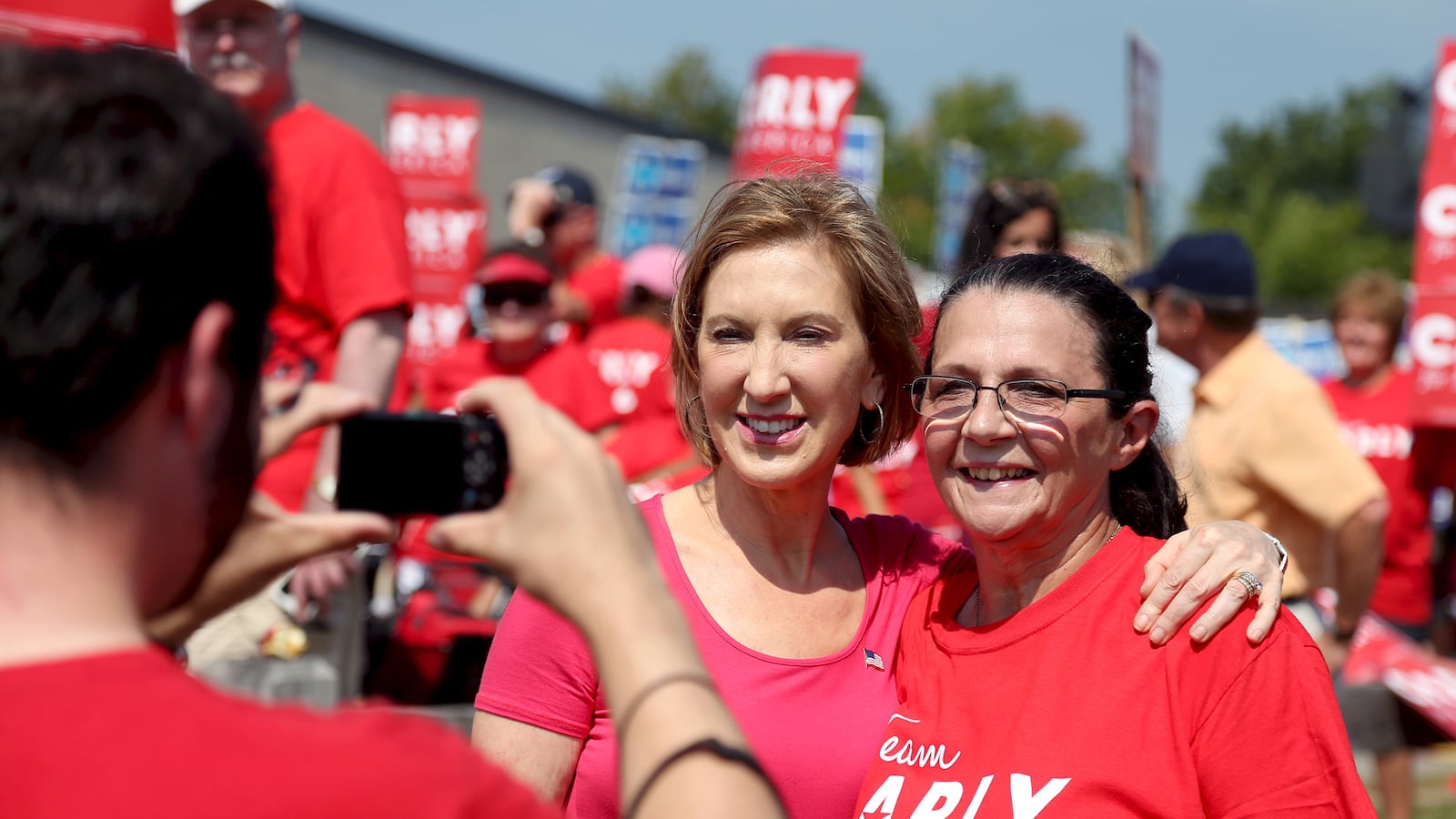Carly Fiorina is trying to thread the needle between opposing identity politics and capitaizing on the personal attacks against her clearly based on gender. Good luck with that.
Carly Fiorina’s website reads, “It is time to declare the end of identity politics.” Earlier this year, Fiorina accused feminism of being a “left-leaning political ideology where women are pitted against men and used as a political weapon to win elections.”
And yet, in the face of what Donald Trump said about Fiorina, his GOP primary rival, in a Rolling Stone story last week—“Look at that face! Would anybody vote for that?”—it would be misleading to call Fiorina’s response anything other than enthusiastic feminist identity politics.
Speaking to the National Federation of Republican Women on Friday, Fiorina said, “Ladies, look at this face. This is the face of a 61-year-old woman. I am proud of every year and every wrinkle.”
And, Fiorina added, “look at all of your faces—the faces of leadership.” The remarks, which arguably helped Fiorina win the group’s straw poll, were turned by the Carly For America PAC into a decidedly feminist new video released today, with the voiceover of Fiorina’s remarks playing against a slide show of proud-looking ordinary American women.
If this isn’t identity politics, than I don’t know what is.
In trying to thread the needle between rhetorically attacking feminism and identity politics while embracing both tactically—a needle that (spoiler alert!) cannot be thread—Fiorina is paradoxically reinforcing the logic behind identity politics-based feminism in the first place.
Donald Trump wouldn’t have said “Look at that face!” about a male candidate. It was a sexist comment. And by pointing it out, and rallying voters around it, Fiorina is effectively saying, “Look, I’m getting treated differently as a candidate because I’m a woman and that’s not right.” This, ladies and gentlemen, is feminism.
To be clear, Fiorina’s candidacy was also predicated on identity politics. It would be naïve for anyone not to acknowledge that the rationale for her candidacy was based at least in part on the GOP’s problem with women voters and tangles on women’s issues in general. Plus, knowledge that a woman would likely be the Democratic frontrunner increased the imperative for a strong female candidate in the Republican field. Otherwise, the party might as well give up on half of the voting public. At least with Fiorina in the race, the party could say it tried. And it would look better for a female Republican candidate to attack the female Democratic candidate—again, trying to hedge GOP appearances of rampant sexism.
That’s not to say Fiorina isn’t qualified on her own to run. Of course, she is—even if her abysmal record at HP hovers like a dark cloud on her resume. But, especially for non-white male candidates, simply wanting to be president and being qualified often isn’t enough.
Marco Rubio is the “young changing demographics” candidate. Ben Carson’s early appeal throughout his political campaign has arguably been that he gives cover to conservative voters who want to oppose Obama without seeming racist. Non-white male candidates—in both parties—exist within identity politics and are judged through that prism. However much they want to argue otherwise on their websites.
Earlier this year, even before announcing her candidacy, the spectrum of sexism loomed for Fiorina. At a press conference with political reporters, one said, out loud, “Well, ma’am, I never met a presidential candidate with pink nail polish on.”
“Well, there’s always a first,” quipped Fiorina at the event.
But afterward, she said to Washington Post columnist Jonathan Capehart, “I’ve been dealing with it all my life.” It, implicitly, being sexism.
And then summing up the identity politics-based rationale for her candidacy, Fiorina told Capehart:
I think that if Hillary Clinton were to face a female nominee, there are a whole set of things that she won’t be able to talk about. She won’t be able to talk about being the first woman president. She won’t be able to talk about a war on women without being challenged. She won’t be able to play the gender card. And so what she will have to run on is her track record, her accomplishments, her candor and trustworthiness and her policies. And I think that’s what elections should be run on. Not identity politics.
Her answer, in other words, once again tried to thread the needle and ended up pricking the reality of politics and American culture today, in which sexism is very real and women leaders are definitely viewed differently—whether they choose to acknowledge it or not.






